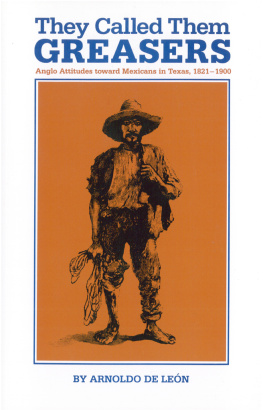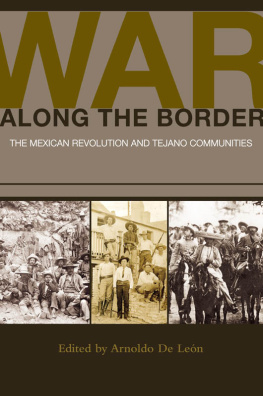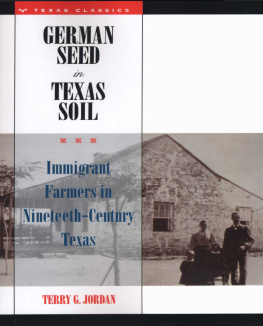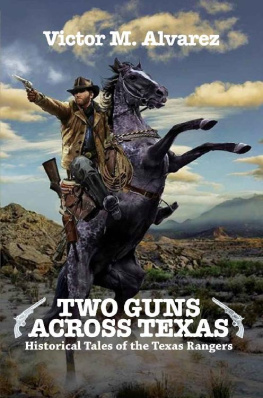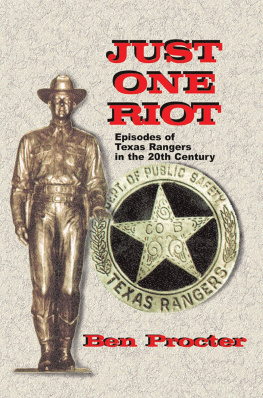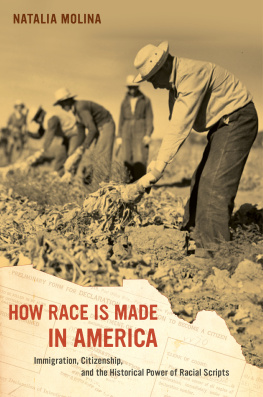Arnoldo De León - They Called Them Greasers: Anglo Attitudes Towards Mexicans in Texas, 1821-1900
Here you can read online Arnoldo De León - They Called Them Greasers: Anglo Attitudes Towards Mexicans in Texas, 1821-1900 full text of the book (entire story) in english for free. Download pdf and epub, get meaning, cover and reviews about this ebook. year: 1983, publisher: University of Texas Press, genre: Politics. Description of the work, (preface) as well as reviews are available. Best literature library LitArk.com created for fans of good reading and offers a wide selection of genres:
Romance novel
Science fiction
Adventure
Detective
Science
History
Home and family
Prose
Art
Politics
Computer
Non-fiction
Religion
Business
Children
Humor
Choose a favorite category and find really read worthwhile books. Enjoy immersion in the world of imagination, feel the emotions of the characters or learn something new for yourself, make an fascinating discovery.
- Book:They Called Them Greasers: Anglo Attitudes Towards Mexicans in Texas, 1821-1900
- Author:
- Publisher:University of Texas Press
- Genre:
- Year:1983
- Rating:3 / 5
- Favourites:Add to favourites
- Your mark:
- 60
- 1
- 2
- 3
- 4
- 5
They Called Them Greasers: Anglo Attitudes Towards Mexicans in Texas, 1821-1900: summary, description and annotation
We offer to read an annotation, description, summary or preface (depends on what the author of the book "They Called Them Greasers: Anglo Attitudes Towards Mexicans in Texas, 1821-1900" wrote himself). If you haven't found the necessary information about the book — write in the comments, we will try to find it.
This seminal work in the historical literature of race relations in Texas examines the attitudes of whites toward Mexicans in nineteenth-century Texas.
Arnoldo De León: author's other books
Who wrote They Called Them Greasers: Anglo Attitudes Towards Mexicans in Texas, 1821-1900? Find out the surname, the name of the author of the book and a list of all author's works by series.
They Called Them Greasers: Anglo Attitudes Towards Mexicans in Texas, 1821-1900 — read online for free the complete book (whole text) full work
Below is the text of the book, divided by pages. System saving the place of the last page read, allows you to conveniently read the book "They Called Them Greasers: Anglo Attitudes Towards Mexicans in Texas, 1821-1900" online for free, without having to search again every time where you left off. Put a bookmark, and you can go to the page where you finished reading at any time.
Font size:
Interval:
Bookmark:
They Called Them Greasers
ANGLO ATTITUDES TOWARD MEXICANS IN TEXAS, 18211900
by Arnoldo De Len

University of Texas Press,
Austin
Copyright 1983 by the University of Texas Press
All rights reserved
Printed in the United States of America
Ninth paperback printing, 2008
Requests for permission to reproduce material from this work should be sent to:
Permissions
University of Texas Press
P.O. Box 7819
Austin, TX 78713-7819
http://utpress.utexas.edu/about/book-permissions
Publication of this work has been made possible in part by a grant from the Andrew W. Mellon Foundation.
LIBRARY OF CONGRESS CATALOGING-IN-PUBLICATION DATA
De Len, Arnoldo, 1945
They called them greasers.
Bibliography: p.
Includes index.
1. Mexican AmericansTexasPublic opinionHistory19th century. 2. Public opinionTexasHistory19th century. 3. TexasRace relations. I. Title.
F395.M5D43 1983 976.40046872 82-24850
ISBN 978-0-292-78054-5 (pbk.)
ISBN 978-0-292-75622-9 (library e-book)
ISBN 978-0-292-78950-0 (individual e-book)
to my wife DOLORES
and my daughters PAULINE and JESSICA

The Tejano Community. From Arnoldo De Len, The Tejano Community, 18361900. Reproduced by permission of the University of New Mexico Press.
Preface
From the moment they landed on the American continent, white people in their role as discoverers, settlers, pioneers, and landholders manifested unique feelings toward the colored or mestizo (mixed-blood) people they encountered. This study deals with only one specific aspect of those feelingshow whites felt about Mexicans in the state of Texas in the nineteenth century. It seeks to ascertain what beliefs whites held, to discover the genesis and roots of those attitudes, to demonstrate in what ways and methods they were expressed, and how they became a sanctioned, functional, and institutionalized part of white society in the attempted debasement of Texas-Mexicans.
Specifically, the book focuses on those feelings as a history of attitudes. It centers on Anglo perceptions of Mexicans in only one state of the Union and does not attempt to make a comparison with the ways whites imagined or dealt with other peoples of color. Nor does it place the study of attitudes within the total structure of United States history or of the state or nations political, social, and economic institutions. But I believe that a study of those attitudes in isolation merits a monograph; thus, this is an effort to sharpen the focus on white feelings toward Mexicanos that are found in the works of other students of Mexican American history.
In its interpretation, the monograph depicts the nuances of the white mind rather unpleasantly. It also points to the fact that those who have traditionally dominated Texas history have published works that reveal, in fact and interpretation, serious flaws, deficiencies of research, and detectable bias, especially concerning the relationships between whites and Mexicans. Strongly influenced by Eugene C. Barker, Walter Prescott Webb, and Rupert N. Richardson, other historians have uncritically followed their mentors paths, overlooking a long racist and ethnocentric tradition toward blacks and Indians that was transposed upon native Texas castas as a matter of course. These same historians also failed to comment upon an austere Anglo-American moral code that translated the morality of Mexicanos into a defective one; a chauvinistic sentiment that discriminated against un-American nonconformists; and the fact that Texas society placed few social restrictions on a long tradition of violence which ultimately aided and abetted white Texans in keeping ethnic minorities subordinated.
The conclusions presented here are set forth in the hope they will prove to be thought-provoking, rather than controversial. To me, these ideas are valid points of departure for a complete and necessary reevaluation of many aspects of Texas history, especially as it relates to nonwhite cultures in the state. White Texans have left an enormous record expressly related to their attitudes toward Mexicans. True, there are no discourses akin to Thomas Jeffersons reflections on blacks in his Notes on the State of Virginia, but the evidence abounds in observations, expressions, actions, and comments of whites as itinerants, observers, pioneers, immigrants, and citizens. Whites did record their impressions of Mexicans, an indication of how very present the Mexicans were in their minds. And they expressed their opinions in a candidly biased tone. The truth of the matter is that whites saw very few redemptive attributes in Tejanos; and aside from patronizing compliments about hospitality, courtesy, and other amenities, their remarks and opinions tended toward disparagement.
Anglos recorded their strongest impulses during those historical moments when they made contact with concentrated pockets of Tejanosin Central Texas from the 1830s to the 1850s and in South Texas at mid-century. Travelers and incoming settlers left a lengthy record of precisely how they felt about Mexicans in those two regions. The way they felt determined both the subtle and the violent aspects of race relations in the antebellum period.
The Civil War proved a dividing mark. The state entered a lull in the 1860s, and, by the time that things resumed their regular gait after Reconstruction, circumstances were no longer the same: contact between whites and Mexicans was more common (except in West Texas) and white relations with Native Americans and blacks took a different turn as the Indians were finally subdued and slavery abolished. Furthermore, the state in general passed into a new epoch. By then the early perceptions were so entrenched among permanent residents as part of institutionalized attitudes, that Texans when recording old feelings of race and ethnocentrism no longer expressed them as strongly as they had when they were newcomers. Exceptions were travelers and more recent arrivals to the state, latecomers searching for opportunity in burgeoning South Texas, and migrants into developing West Texas in the 1870s and 1880s who were encountering Mexicans for the first time and took notice of what older Texans had observed before the Civil War. It was they who now expressed the more exaggerated responses when noting things that local whites considered matter-of-fact or natural. The native population by this time accepted Mexicanos in the patterns they had forged during the initial encounters and treated them accordingly. These feelings that Mexicans were like that remained the rationalization for the Anglo citizens of Texas who continued discriminatory and violent actions against Mexicanos.
In formulating my argument, I have remained receptive to the idea that the expressions of whites toward Mexicans were partially ones of ethnocentrism. However, I cannot help but support the theory that whites in the nineteenth century were more racists than cultural chauvinists. The evidence is heavy that Anglos perceived the physical contrasts of Mexicans as indicating mental and temperamental weaknesses. Moreover, my findings square with recent scholarship which argues that racism originated either in the Western psyche, in capitalist social development, or in religion, and that native peoples in the path of white civilization have historically been either exterminated or reduced to a hereditary caste because of the peculiar strain of that racism. In any case, this is a study of both Anglo ethnocentrism and racist attitudes toward Mexicans.
Only in passing have I attempted to take issue with the several stereotypes advanced by Anglos. Certainly, some of what white men said about Mexicans was true; but most was not. The Tejano community that Anglos observed was more a product of their attitudes than a correct perception of that society. It has not been my purpose to counter the statements of Anglos with lengthy descriptions of what the Tejano community was actually like. My intention here is solely to interpret Anglo attitudes toward Tejanos. Those wishing a more correct portrayal of Texas Mexican society may turn to my earlier book,
Next pageFont size:
Interval:
Bookmark:
Similar books «They Called Them Greasers: Anglo Attitudes Towards Mexicans in Texas, 1821-1900»
Look at similar books to They Called Them Greasers: Anglo Attitudes Towards Mexicans in Texas, 1821-1900. We have selected literature similar in name and meaning in the hope of providing readers with more options to find new, interesting, not yet read works.
Discussion, reviews of the book They Called Them Greasers: Anglo Attitudes Towards Mexicans in Texas, 1821-1900 and just readers' own opinions. Leave your comments, write what you think about the work, its meaning or the main characters. Specify what exactly you liked and what you didn't like, and why you think so.

